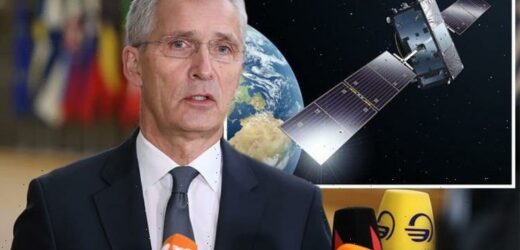Russia: US condemns ‘reckless’ missile test
We use your sign-up to provide content in ways you’ve consented to and to improve our understanding of you. This may include adverts from us and 3rd parties based on our understanding. You can unsubscribe at any time. More info
The warning comes after US Space Command announced Russia had tested an anti-satellite weapon in orbit on Monday, triggering an emergency on the International Space Station (ISS). The missile test created a cloud of fast-moving debris that came alarmingly close to the orbital laboratory. Addressing the crisis at the European Council on Tuesday, NATO Secretary-General Jen Stoltenberg condemned Russia’s “reckless” behaviour.
The former prime minister of Norway said the test had put the ISS and China’s Tiangong space station in harm’s way and put other vital orbital infrastructure at risk of destruction.
He told reporters: “So this was a reckless act by Russia to actually shoot down and destroy a satellite as part of a test of an anti-satellite weapon system.”
Russia’s missile test has also sparked concern about the safety of key services such as communications and global navigations satellite systems (GNSS).
There are presently four GNSS satellite constellations in orbit, each servicing a different part of the globe.
These are the US Global Positioning System (GPS), Russia’s GLONASS, China’s BeiDou and the European Union’s Galileo.


There are also two regional systems – Japan’s QZSS and India’s IRNSS.
Europe’s Galileo provides a host of services for the public sector, powering truck drivers and emergency services alike.
According to European Union Agency for the Space Programme, without the Galileo signal, all these services “would come to a standstill”.
Mr Stoltenberg has now claimed Russia’s actions in orbit have put NATO’s and its allies’ interests at risk.
He said: “NATO [does] not weaponize space, but the satellites that capabilities NATO Allies have in space are extremely important for what is going on Earth.
NASA: International Space Station captured passing the sun
“Communications, navigation, early warning, all of that is dependent on space capabilities.
“So of course when Russia now tests new space weapons, when they test it also by actually destroying a space capability creating a lot of dangerous debris that is concerning both.
“Because the debris actually poses a risk to civilian activity in space, but is also of concern because it demonstrates that Russia is now developing new weapons systems that can shoot down satellites, can destroy important space capabilities for basic infrastructure on Earth like communications, like navigation, or like early warning of missile launches.”
Russia has confirmed Monday’s test took place but has denied ever putting orbiting spacecraft at risk.


Moscow’s Defence Ministry said in a statement: “The Russian Ministry of Defence successfully conducted a test on November 15 that hit the non-operational Russian spacecraft Tselina-D, which had been in orbit since 1982.”
US officials, however, have claimed the resulting debris cloud will pose a threat to space operations for years to come.
Travelling at more than 17,000mph, even the smallest pieces of orbital debris can punch through the hull of a spacecraft.
The missile test has also been condemned by NASA Administrator Bill Nelson, who branded it an “irresponsible and destabilizing action”.
He said: “With its long and storied history in human spaceflight, it is unthinkable that Russia would endanger not only the American and international partner astronauts on the ISS, but also their own cosmonauts.
“Their actions are reckless and dangerous, threatening as well the Chinese space station and the taikonauts on board.
“All nations have a responsibility to prevent the purposeful creation of space debris from ASATs and to foster a safe, sustainable space environment.
“NASA will continue monitoring the debris in the coming days and beyond to ensure the safety of our crew in orbit.”
Source: Read Full Article

